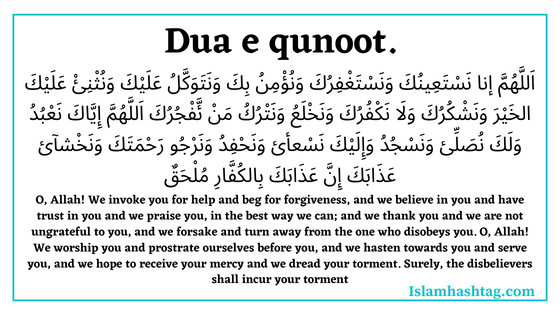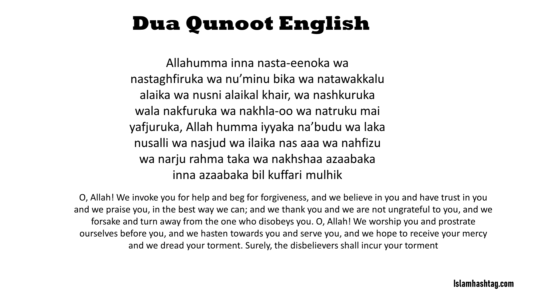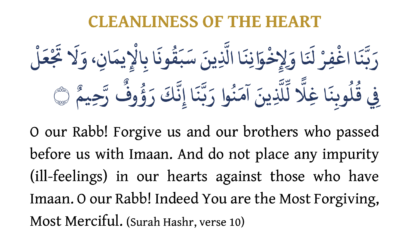Dua e Qunoot English and Arabic Find out the difference between Qunoot and Qunoot Nazilah
Dua e Qunoot is usually recited in Witr salah and the Maliki and Shafis read it in Fajr salah too.
Which dua Qunoot is correct?
If you look into the books of Duas, you will find 2 Dua Qunoot.
There are 2 types of Dua Qunoot which are famous–
- Dua e Qunoot of witr
- Dua e Qunoot of Fajr (Qunoot in 2nd rakat of Fajr habitually).
There is another type of Qunoot called as Qunoot -e-Nazila (It is doing Qunoot in 2nd rakat of Fajr during dire need of the Muslims).
kunut dua :The 2 Dua e Qunoot- 2 narration of Dua e Qunoot Dua
The following are two narrations regarding it :
قَالَ الْحَسَنُ بْنُ عَلِيٍّ رَضِيَ عَنهُمَا عَلَّمَنِيْ رَسُولُ صَلَّى عَلَيْهِ وَسَلَّمَ كَلِمَاتٍ أَقُوْلُهُنَّ فِي الْوِتْرِ قَالَ ابْنُ جَوَّاسٍ فِيْ قُنُوْتِ الْوِتْرِ الَّلهُمَّ اهْدِنِيْ فِيْمَنْ هَدَيْتَ وَعَافِنِيْ فِيْمَنْ عَافَيْتَ وَتَوَلَّنِيْ فِيْمَنْ تَوَلَّيْتَ وَبَارِكْ لِيْ فِيْمَا أَعْطَيْتَ وَقِنِيْ شَرَّ مَا قَضَيْتَ إِنَّكَ تَقْضِيْ وَلَا يُقْضَى عَلَيْكَ وَإِنَّهُ لَا يَذِلُّ مَنْ وَالَيْتَ وَلَا يَعِزُّ مَنْ عَادَيْتَ تَبَارَكْتَ رَبَّنَا وَتَعَالَيْتَ
Hadhrat Hasan ibn Ali رضي الله عنه states that the Messenger of Allah ﷺ taught me some words that I say during the witr. (The version of Ibn Jawwas has: I say them in the supplication of the witr.)
They were: “O Allah, guide me among those whom You have guided, grant me security among those whom You have granted security, take me into Your charge among those whom you have taken into Your charge, bless me in what You have given, guard me from the evil of what You hast decreed, for You decree, and nothing is decreed for You. He whom You have befriended is never disgraced; he whom you have made an enemy is never honoured. Blessed and Exalted are You, our Lord.”
الَّلهُمَّ إِنَّا نَسْتَعِيْنُكَ وَنَسْتَغْفِرُكَ وَنُؤْمِنُ بِكَ وَنَتَوَكَّلُ عَلَيْكَ وَنُثْنِيْ عَلَيْكَ الْخَيْرَ كُلَّهُ نَشْكُرُكَ وَلَا نَكْفُرُكَ وَنَخْلَعُ وَنَتْرُكُ مَنْ يَفْجُرُكَ الَّلهُمَّ إِيَّاكَ نَعْبُدُ وَلَكَ نُصَلِّيْ وَنَسْجُدُ وَإِلَيْكَ نَسْعَى وَنَحْفِدُ نَرْجُوْ رَحْمَتَكَ وَنَخْشَى عَذَابَكَ إِنَّ عَذَابَكَ بِالْكُفَّارِ مُلْحِق
“Oh Allah! We implore you and we beg forgiveness of You and we believe in You and we rely on You and extol You and we are grateful to You and we are not ungrateful to You and we alienate and forsake him who disobeys You. Oh Allah!You alone do we worship and for You do we pray and prostrate and we betake to please You and present ourselves for service in Your case and we hope for Your mercy and fear Your chastisement. Undoubtedly Your severe torment is going to overtake the disbelievers”
The first Qunoot was taught to Hadhrat Husain رضي الله عنه by the Prophet صلى الله عليه وسلم and the second Qunoot is the Qunoot that was practised by many of the Sahabah including Hadhrat Umar , Hadhrat Uthman , Hadhrat Ali , Hadhrat Abdullah ibn Mas’ud, Hadhrat Ubayy ibn Ka’ab رضي الله عنهم and many others.
One may read any one of the two duas. However, according to the Hanafi school of thought, the second dua is preferred and infact emphasised.
Qunoot of Witr : The 1st of the 2 types of Dua e Qunoot -dua e qunoot hanafi
Dua e Qunoot Arabic
اَللَّهُمَّ إنا نَسْتَعِينُكَ وَنَسْتَغْفِرُكَ وَنُؤْمِنُ بِكَ وَنَتَوَكَّلُ عَلَيْكَ وَنُثْنِئْ عَلَيْكَ الخَيْرَ وَنَشْكُرُكَ وَلَا نَكْفُرُكَ وَنَخْلَعُ وَنَتْرُكُ مَنْ ئَّفْجُرُكَ اَللَّهُمَّ إِيَّاكَ نَعْبُدُ وَلَكَ نُصَلِّئ وَنَسْجُدُ وَإِلَيْكَ نَسْعأئ وَنَحْفِدُ وَنَرْجُو رَحْمَتَكَ وَنَخْشآئ عَذَابَكَ إِنَّ عَذَابَكَ بِالكُفَّارِ مُلْحَقٌ
Dua e Qunoot English/ Dua e Qunoot transliteration
Allahumma inna nasta-eenoka wa nastaghfiruka wa nu’minu bika wa natawakkalu alaika wa nusni alaikal khair, wa nashkuruka wala nakfuruka wa nakhla-oo wa natruku mai yafjuruka, Allah humma iyyaka na’budu wa laka nusalli wa nasjud wa ilaika nas aaa wa nahfizu wa narju rahma taka wa nakhshaa azaabaka inna azaabaka bil kuffari mulhik
Dua Qunoot in English
O, Allah! We invoke you for help and beg for forgiveness, and we believe in you and have trust in you and we praise you, in the best way we can; and we thank you and we are not ungrateful to you, and we forsake and turn away from the one who disobeys you. O, Allah! We worship you and prostrate ourselves before you, and we hasten towards you and serve you, and we hope to receive your mercy and we dread your torment. Surely, the disbelievers shall incur your torment
Dua Qunoot before or after Ruku
Most scholars say the Qunoot should come after bowing or after the Ruku (i.e. after saying sami allahu liman hamidah rabbana lakal hamd). You would then raise your hands for supplication and recite the qunoot. After finishing the imam would say takbeer, “allahu akbar” and go into sujud. It’s also acceptable the qunoot dua be done done before going into the ruku.
As a Hanafi- should one raise the hands in Dua Qunoot or not
Hanafi scholars say that folding the hands in Qunoot is Sunnah and thus more beloved to Allah Ta’ala. Therefore, when supplicating in Witr you should rather attempt to supplicate in a manner/position that is most beloved to Him.
Accordingly, one should not raise the hands in supplication whilst reciting the Qunoot in Witr prayer.
If one misses Dua Qunoot, what should he do?
If one forgetfully missed the Du’aa e Qunoot in the Witr Salaah. In such an instance, Sajda Sahw is necessary.
Which Surahs to recite in Witr salah?
It is Sunnah to recite al-A’laa in the first rakah, al-Kafiroon in the second rakah, and al-Ikhlaas in the third rakah. Imam Tirmidhi narrates in his Sunnan:
عن ابن عباس قال كان ان النبي صلى الله عليه وسلم يقرأ في الوتر بسبح اسم ربك الأعلى وقل يا أيها الكافرون وقل هو الله أحد في ركعة ركعة (الترمذى)
Ibn Abbas (Radhiyallahu Anhu) narrates that Nabi (Sallalahu Alaihi Wasallam) used to recite in Witr ‘Sabihisma Rabika al-Ala’, Qul Ya ayuha al-Kafiroon, and ‘Qul Hu Allahu Ahad’ in separate rakat.
However, it is disliked to fix these surahs on a daily basis for Witr and not to recite other surahs besides these, as people will start considering it to be Wajib. It should be done occasionally (Rad al-Muhtar )
2. Qunoot of Fajr : Second of the 2 type of Dua e Qunoot
There is ikhtilaf in Qunoot of Fajr:
The Hanafis do not read Qunoot in Fajr while the Maliki and shafi read Qunoot of Fajr. So Let us read about the ikhtilaf of Qunoot of fajr. (ref)
- Malik and Shafei say that before ruku in 2nd rakat of Fajr Qunoot is necessary for the entire year.
- Malik says its mustahab and Shafei says its sunnah.
- Ahmed bin Hanbal, Ishaq bin Rahway and Imam Abu Hanifa(RA) say that there is no Qunoot in Fajr except Qunoot-e-Nazila,
a) The first saying: The Shafi’is and Malikis said that qunut in the dawn prayer is a Sunnah, As evidence of what was narrated in the Sunnah of the Prophet, from the words of the Prophet – upon him be blessings and peace – on the authority of Anas bin Malik – may God be pleased with him – that he said: (The Messenger of God, may God’s prayers and peace be upon him, still used to say qunoot in the morning prayer until he left the world)
and they said based on That is because whoever forgets qunoot in the morning prayer, whether intentionally or inadvertently, then he prostrates for forgetfulness, and the place for qunoot in the morning prayer is after rising from bowing according to the Shafi’is, while it is before bowing according to the Malikis.
b) The second saying: The Hanafi and Hanbali scholars said that there is no qunoot in the Fajr prayer
The rule of Qunut-e-Nazila / Qunut al-Nawazel -Which Dua should be recited in the prayer of Qunoot Nazilah?
The scholars differed regarding the ruling on qunut when calamities and tribulations occur, and their disagreement is explained in the following:
a) The first saying: Shafi’i, Hanbali, Hanafi, and some Maliki scholars said that Qunut al-Nawazil should be read , and that it is a Sunnah from the Prophet – upon him be blessings and peace -, which is the saying of Ibn Taymiyyah and Ibn al-Qayyim.
Inferred by the action of the Prophet – upon him be blessings and peace -, as it was proven in Sahih Al-Bukhari on the authority of Abu Hurairah – may God be pleased with him – that he said: (The Messenger of God, may God’s prayers and peace be upon him, if he wanted to invoke against someone or supplicate to someone, he recited after bowing) .
b)The second saying: The Malikis said that the descending qunut is not correct , and they inferred that the Prophet left it after he prayed for it. The reason for qunoot al-Nawazl The scholars of the sects differed in defining the criteria for calamities in which qunoot is prescribed, and stating the opinion of each sect as follows:
- Shafi’i: Qunut al-Nawazil is prescribed when fear of the enemy, or the occurrence of rain, or the injury of locusts that spoil the crops, just as it is prescribed when special calamities occur that affect Muslims in general, and from that he lost knowledge, and the evidence for that is the act of the Prophet – upon him be blessings and peace – when he recited and supplicated against the killers of his companions, as proven in Sahih Muslim from the words of Anas bin Malik: (Indeed, the Messenger of God, may God’s prayers and peace be upon him, prayed for a month against people who killed some of his companions) .
- Hanbali and Hanafi: Qunoot for calamity is prescribed when some hardships and calamities befall the Muslims, with the exception of the plague * according to the Hanbalis and not others.
The amount of Qunut -e-Nazila / qunoot al-Nawazl Qunoot during a calamity
- according to the Shafi’is does not harm, even if it takes a long time.
- the Hanafis believe that qunut is estimated by the duration of reading Surat Al-Inshiqaq,
- and the Hanbalis preferred that qunoot be short ; Unless there is a need for lengthening, or urgency in supplication.
Discover more from Islam Hashtag
Subscribe to get the latest posts sent to your email.







